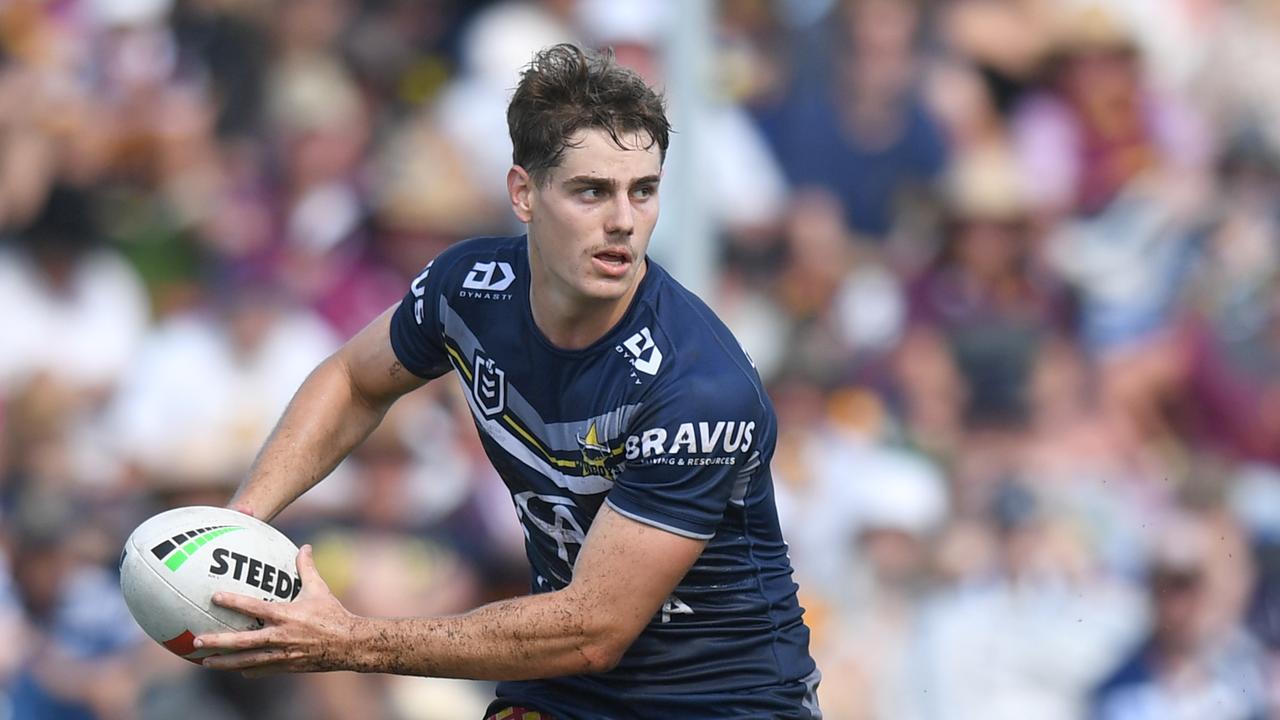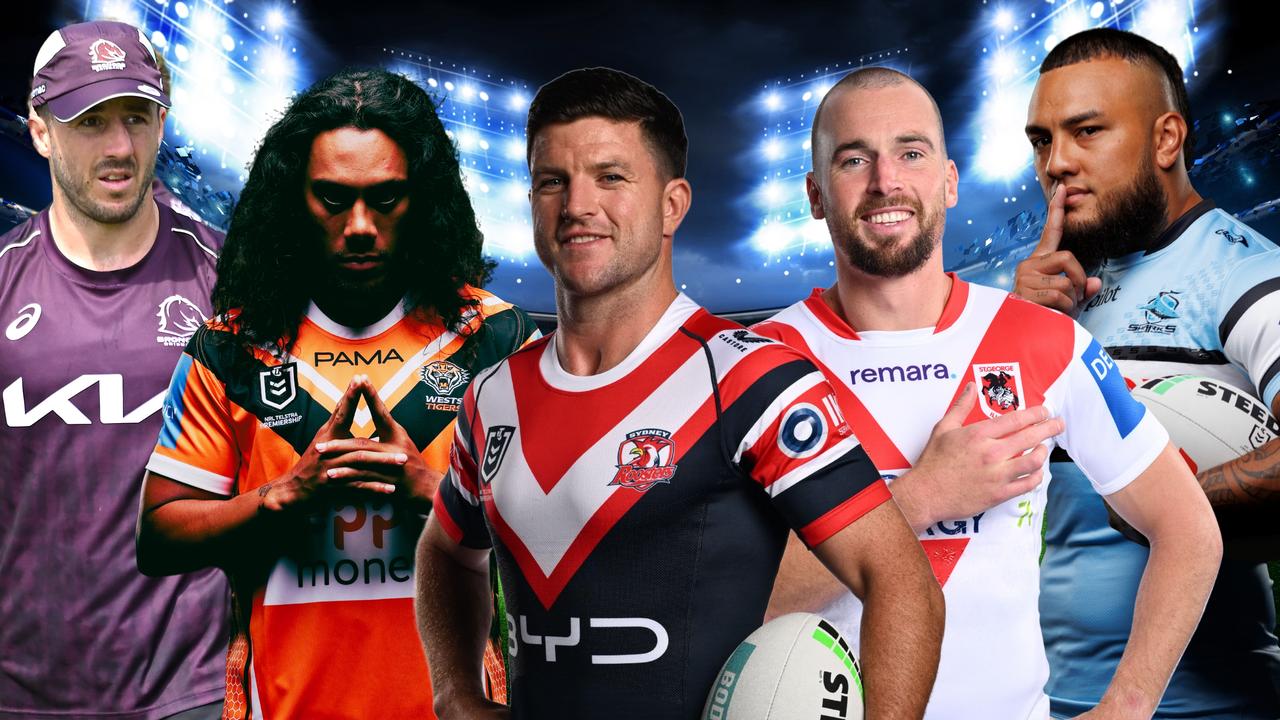NRL 2022: Time for NRL to stop being political, Paul Kent
When you try to stand for everything sometimes you end up standing for nothing, and the NRL has finally jumped the shark by pushing it’s political agenda too far, writes PAUL KENT.
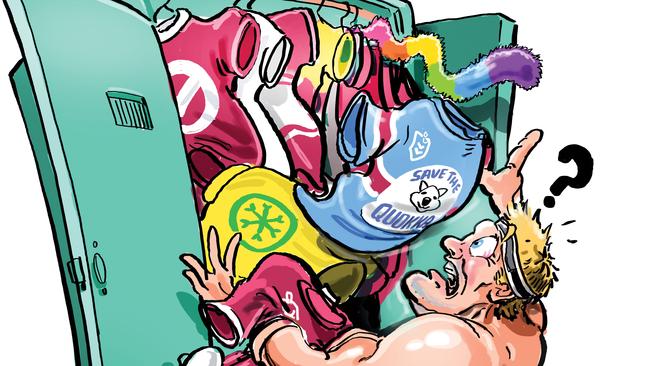
Like punch-drunk fighters, NRL players have begun wobbling to the corner of their dressing rooms, slumping on a bench and blubbering to their cornermen an age old phrase: “What round is it”?
It’s Women In League round, they are told, and so they rustle through their bags, all thumbs, looking for a splash of pink.
No, it’s Indigenous Round, says the coach over the bedlam, and so immediately they return to their kit bag looking desperately for a jersey with dots to symbolise the stars or the burnt ground or something that might suggest the sparks from a burning branch.
“No, no, no,” says the marketing guy, “it’s Multicultural Round, its theme is ‘stronger together’, which went down just brilliantly in the dot point presentation.”
“How’s that different from Indigenous round?” the player asks.
“Different jersey basically,” says the marketing guy, “and at $159.99 a pop …”
Stream every game of every round of the 2022 NRL Telstra Premiership Season Live & Ad-Break Free During Play on Kayo. New to Kayo? Start your free trial now >
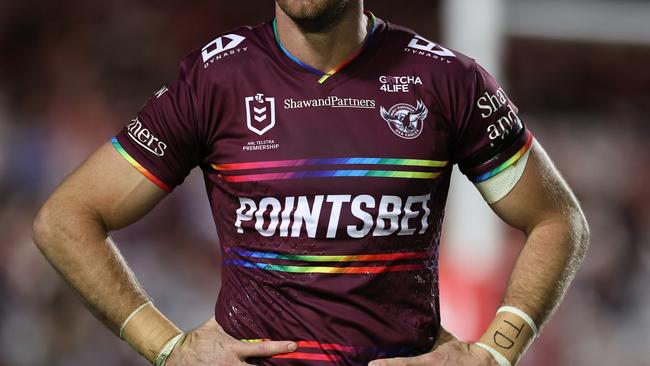
The player nods wearily, shoulders slumped, doing all he can not to drool.
“What’s this,” he asks, holding up a jersey that on second look could be a Penrith jersey. Or maybe Melbourne.
“Not that,” says the guy from sponsoring, “that’s a ‘Play NRL’ jersey, that got dropped from the rotation years ago.”
The player falls face first into his kit bag, finally defeated.
“Quick! Somebody pick him up,” shouts the coach, “we need him for Beanies for Brain Cancer Round.”
The defeated player is lifted on a stretcher and wheeled out before the depth of his confusion can spread through his teammates, his final words trailing off: “Doesn’t anyone just play footy anymore?”
“Footy?” says the marketing guy. “What’s that?”
And so here we are …
The NRL is a billboard nowadays.
What began with a City Ford sponsorship nearly 50 years ago has developed an arm that sometimes resembles a political movement nowadays, with a multitude of causes, and nearly all worthwhile in their own way.
Sometimes, though, when you try to stand for everything you end up standing for nothing. By trying to be all things to all people the NRL finally jumped the shark this week.
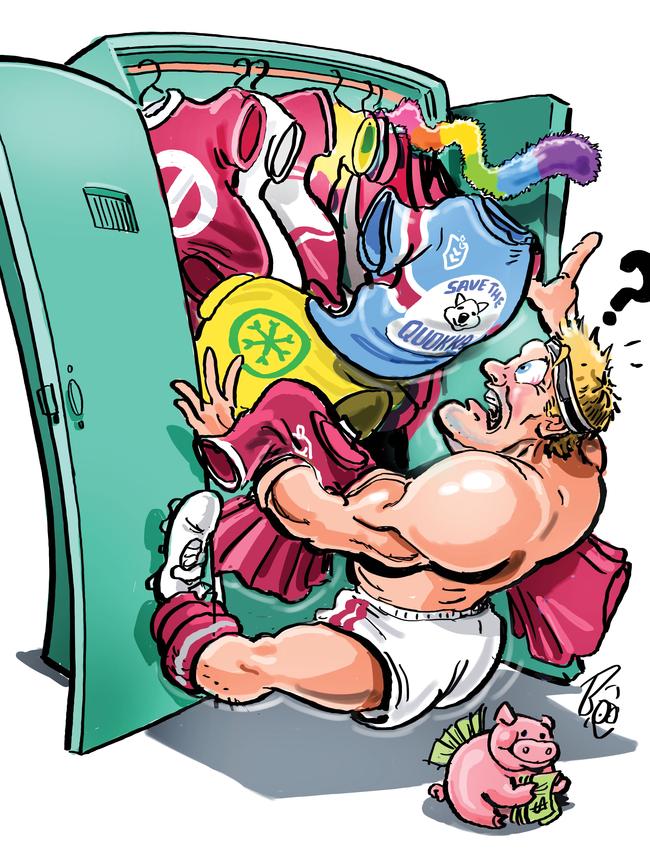
Driven by good intent the Manly Sea Eagles made the decision to impose its political agendas on its players, the consequences enough that it might have likely cost them a finals appearance.
Seven players withdrew in protest and the Sea Eagles lost to the Sydney Roosters, who for the moment go two points ahead of them on the ladder to outright eighth.
It is time for the NRL and its clubs to stop being political, something they should already know.
Several years ago the fires were burning down Australia’s east coast and with a gruesome orange lighting the sky then-NRL chief executive Todd Greenberg presented to the ARL Commission a proposal for the NRL to publicly support climate change.
Greenberg was quickly put in his place, but has since got a variation over the line since moving to cricket.
Back then the NRL was clear that it was not in the business of making political statements.
Yet now it is.
It has slowly been creeping into the NRL in recent years in some misguided search for enlightenment or togetherness or, perhaps, if you want to be a cynic, jersey sales. Each team will wear at least six different jerseys this year, which gets expensive for the battlers.
Some years back the NRL also released its promotional campaign for the season which was heavily directed at making a social statement.
It angered many of the philistines, who wondered why the game was moving into making political statements.
The NRL should be apolitical.
Politics fracture, it rarely unites.
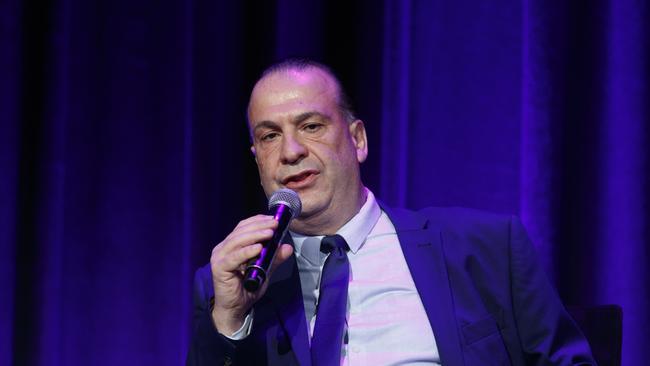
The frustrating part to those of us old enough to remember when the only political choice to make in rugby league was whether to support the Fibros or Silvertails is we know that the NRL knows this.
We saw it two years ago when the nation went into a Covid lockdown and anyone not considered to be working in what was an essential service sat at home watching television, which was the least of the sins committed.
With the NRL prepared to remain suspended until September, ARL chairman Peter V’landys went rogue and, in one of the great displays of leadership, pushed for a May 28 return.
The critics, panicking that the playing of rugby league would see the earth collapse in on itself, slammed the league for its arrogance and for pushing ahead.
They tried to politicise the lockdown, and attacking the NRL was a convenient strategy.
Among the defence V’landys offered was the simple reality that rugby league was an “escape”.
People stuck at home could do with the distraction of watching footy, and the distraction from the politics being played between the major parties and the stress of the pandemic itself.
The NRL was an escape from all of that.
Yet each season the game subtly ramps up its political activism dressed as some kind of community service, apparently because league fans are too docile to form their own decisions.
If it is considered impolite to discuss politics or religion in broader society, why is the game imposing its values on its fans?
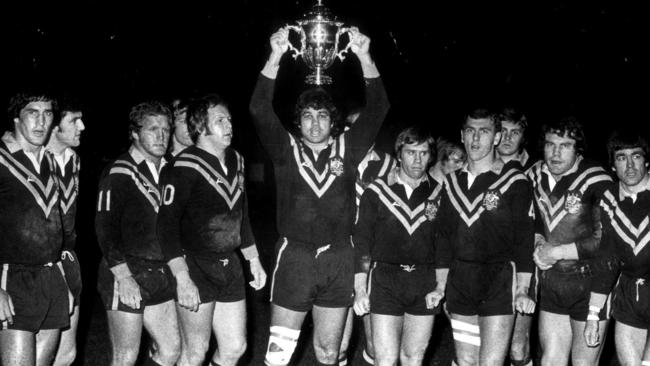
Manly chairman Scott Penn is delusional to try to sell the story that the jersey was for Everyone In League, as he claimed in his statement.
The rainbow is a universal symbol of gay pride.
Assumptions the likes of Penn or Manly or the NRL itself are somehow enlightening broad sections of their fans by pushing their own politics are insulting.
Sport has always been an escape from that.
A place where we put political differences aside and racial differences soothed and the measure of worth was how hard you hit the ball up, how many tackles you got through or what you did for your team.
For most of its existence rugby league has had a very much live and let live approach to life off the field, driven mostly by its reputation as a sport born from the lower socio-economic groups.
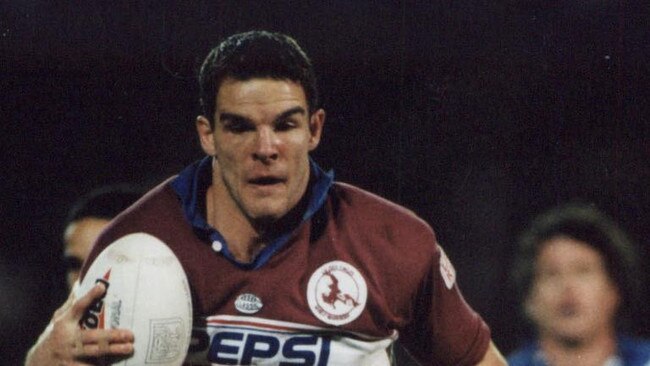
The proud spin-off is that it has Arthur Beetson as the first Indigenous athlete to captain Australia in any sport.
And Ian Roberts was the first high profile athlete to come out as homosexual.
And for those questioning why there has been no one else since Roberts to publicly out themselves, do a favour and don’t portray it as a rugby league problem.
How many cricketers, male or female, have come out publicly? How many in AFL?
When was the last jockey to come out? The last netballer?
Sporting bodies and sporting clubs should not be imposing their political values on their athletes, or their fans.
Otherwise, there is nowhere to escape.
TIME TO SCRAP AUGUST TRANSFER DEADLINE
The trickle of players making late season changes will continue to swell unless the NRL blows up its August 1 deadline and returns to the much more suitable June 30 date.
August 1 is too late in the season and sees the game already in the early stages of understanding how to weaponise the late transfer date.
The trouble is the NRL has always pushed the strength of its own tribalism, yet the August 1 deadline continues to undermine it.
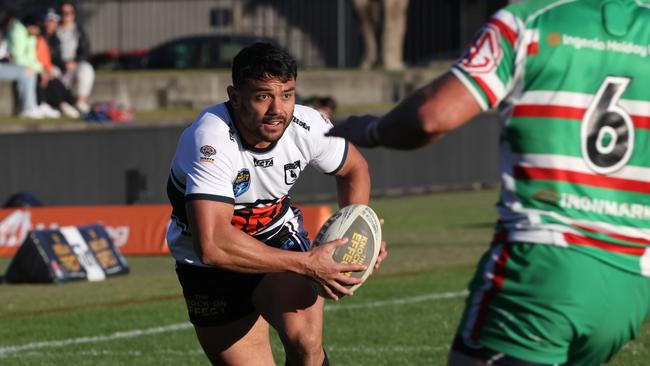
Hopefully it is just a remnant for when it was needed to help clubs through the Covid pandemic, particularly the Warriors based in Queensland at the time, when teams did not have their State league teams playing so their numbers of active players were seriously restricted.
For reasons that can, hopefully, be only an oversight, though, the deadline is still in place and teams are slowly understanding how to maximise it.
Yesterday, Marty Taupau put in a request to leave Manly immediately so he can join Parramatta for the rest of the season. Just six games remain in the regular season.
Midway through the week the Melbourne Storm finally landed an outside back to nurse them through the rest of the season when David Noufaluma was loaned for the rest of the season.
The troubleshooting of rosters will only grow when teams see its benefit.
It won’t take much for teams to leave space in their salary cap for late season signings that might provide the polish needed late in the season, whether they suffer injuries or not, which defeats much of what the season is about, which includes the endurance to last the season.
To say nothing, remember, of the tribalism the game holds dear.




